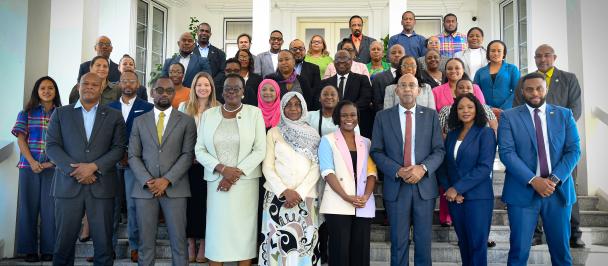
Today, Vincentians have lots of reasons to smile as the Government and People of St Vincent continue recovery efforts with the support of the Spanish Agency for International Development Cooperation (AECID) and United Nations Development Programme (UNDP). The spirit of resilience is intertwined with every person within the beautiful nation, which despite the devastating power of nature continues to stand tall.
Photo: BajanPro/UN Barbados and the Eastern Caribbean
"And in one terrible moment, everything changed"
Gray skies and fields are not normally associated with the tropical environment of the beautiful country of St. Vincent and the Grenadines, but a year ago the landscaped transformed dramatically when the La Soufrière Volcano erupted displacing approximately 20,000 people with 30 communities being evacuated. The ash clouds and threat of further devastation still hovers in the recesses of current memory like a bad dream, but the volcano has once again resumed its slumber. However, the impacts of its awakening can still be seen 12 months since the disaster sought to undermine all the gains the country had made towards improving its resilience and promoting sustainable development.
Photo: BajanPro/UN Barbados and the Eastern Caribbean
“The ash covered everything”
Entire villages were covered in ashes, buildings damaged, schools and businesses closed, crops and livestock destroyed, and residents left with limited access to clean drinking water. But the resilience of the people of St. Vincent and the Grenadines and the Caribbean would prevail. UNDP Barbados and the Eastern Caribbean mobilised US$300 000 from UNDP Core Funding towards the relief efforts as additional funds were raised by other UN partners and support organisations. To date, over 20,000 cubic tonnes have been removed and while there is still additional clean up required, life is returning to normal.
Photo: UNDP Barbados and the Eastern Caribbean
“The AECID funding allows us to continue efforts”
Sustained recovery efforts require substantial financial support and the Spanish Agency for International Development Cooperation (AECID) provided USD 416,204.00 (EC$1.1 million) through a partnership with UNDP Barbados and the Eastern Caribbean to strengthen recovery efforts in country. This additional resource allowed for Phase 2 to be expanded and more communities to receive assistance. The former UNDP Resident Representative for Barbados and the Eastern Caribbean, Valerie Cliff and the Spanish Ambassador Fernando Nogales visited St. Vincent on November 21, 2021 to see first-hand the devastation caused by the eruption and to view progress on the ash removal.
Photo: UNDP Barbados and the Eastern Caribbean
Photo: UNDP Barbados and the Eastern Caribbean
“Assist persons now, while planning for recovery and resilience in the future”
During the crisis it was important to play a delicate balancing game. The immediate needs of persons needed to be met but continuous development of the country to regain the ground lost towards the SDGs and local resilience could not be neglected. The government with the support of UNDP Barbados and the Eastern Caribbean, other UN Partners and developmental agencies responded to the eruption of La Soufrière volcano with a comprehensive 3 pillar recovery strategy. Pillar 1 prioritises the execution of Household and Building Damage Assessments (HBDA) which will allow for data driven and evidence-based decision-making processes. While Pillar 2 addresses more immediate needs of cleaning volcanic ash, clearing debris and supporting economic reactivation in the most affected areas while providing emergency employment to over 2,000 households directly affected by the volcano eruption.
“Compounded by the effects of the COVID-19 pandemic”
The volcano was not the only disaster that the country was facing, as the COVID-19 pandemic wreaked havoc across the world with the region feeling the brunt of the effects as tourism industries were crippled and economies crashed. To address the economic impacts while still providing the much-needed Ash removal, UNDP partnered with the Buildings, Roads and General Services Authority (BRAGSA) to roll out a fully functional ash removal programme in June: providing temporary employment to approximately 185 persons (108 men, 77 women). 42% of the workers were women, with specific priority being given to women who headed their households.
“There is still much to do”
It has been a year of recovery and while life has regained some normalcy, the eruption setback development efforts and these gains must be recovered and built upon. To date UNDP continues to support the Government and people of St Vincent and the Grenadines in recovery efforts. Currently, with additional financial support by AECID, Phase 2 advances the emergency employment and ash clean up and expands work to improve access to feeder roads through de-bushing activities and has recently been completed. 2,010 persons (904 women and 1,106 men) who experienced financial hardships due to the volcanic eruption, received short term livelihood support tied to ash and debris removal allowing for the purchase of essential food and household items. At present, approximately 32KM of roads have been cleared allowing safe access to farms and facilitating the continuance of farmer livelihoods following the volcanic eruption
As St. Vincent and the Grenadines continues to seek innovative solutions to build resilience and ensure livelihoods for traditionally vulnerable groups, UNDP Barbados and the Eastern Caribbean, in partnership with the government and stakeholders, remains dedicated to the advancement of inclusive and sustainable development and building resilient communities guided by the Blue Economy for Green Islands Approach.

 Locations
Locations








